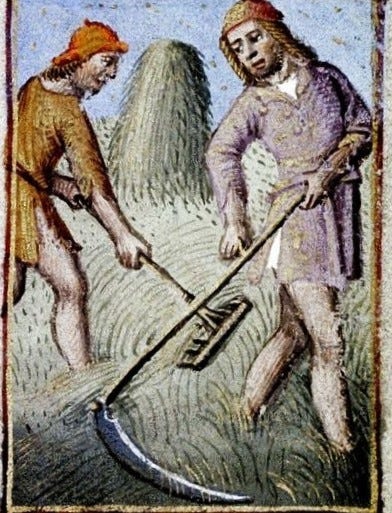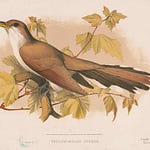In celebration of the two-year anniversary of Word & Song on the Fourth of July, we are offering a special rate on paid, gift, and upgraded subscriptions. Stay tuned this week for more!
There’s a great scene in Peter Weir’s film Witness — an excellent movie about two incompatible cultures coming into contact, because an Amish boy has accidentally been witness to a murder in Philadelphia, and the corrupt police force, as we learn, is out to eliminate him. But the honest (though worldly) policeman, John Book, goes seeking the boy, trying to get to him before the bad men do, and in this effort he ends up, in plain clothes, as part of an Amish community. He is, in their words, “English,” what the Amish call everybody who isn’t Amish, wherever they come from. He’s utterly out of place, or seems to be, until it is time for work, especially at a barn-raising, where all the men, young and old, are knocking together the skeleton of the building and then clambering all over it, standing on bare boards twenty and thirty feet off the ground, doing all the work by hand with saws and hammers and augers and pegs. Meanwhile the women are preparing food below and working on what will beautify the building and help make it useful, too, while the children do their part, in great cheer and with a lot of sweat. The men see that Book is a good hand at the work, and the work, partaking of the high spirit of play, brings them together as nothing else, short of worship and sacred song, could have done.
Now, there are scenes in the film that will keep us from featuring it at Word and Song; we have focused always on the Golden Age of Hollywood, roughly 1935-1965. But I thought that one barn-raising scene would set up very nicely our Poem of the Week, Robert Frost’s “The Tuft of Flowers.” It is one of his earliest poems, published in his first book, A Boy’s Will, and it does breathe the spirit of youth, untouched by the sour disappointments of age and the vinegary satire that often characterize his latest work. The scene is a simple one — apparently simple, that is. We have two men who are out making hay. The first one cuts the grass with his scythe. The second one, the speaker, coming after, turns the cut grass with his fork. The speaker wants to get to know the other fellow, to befriend him, but it seems to him that the work has crowded out all opportunities for that. “Men work alone,” he says to himself, “whether they work together or apart.”
But it doesn’t end there. For work, and maybe especially the work that calls for our Word of the Week, sweat, need not be just a matter of getting something done that is practical and efficient. As I’ve put it elsewhere, the whole week need not be made up of Mondays. The speaker goes on with his grass-turning, noticing a butterfly that is looking for what used to be there but suddenly isn’t anymore, and all at once that little papery creature directs his attention to a tuft of flowers in full bloom, beside a brook — a tuft that the man with his scythe has spared. Why did he spare the flowers? Only because they are flowers; they are beautiful. It strikes the speaker as a silent witness to the other man’s heart. He knows why the reaper left the flowers to live. He would have done the same. They’re brought together, we see, by a common sense of beauty, and the honor or the mercy that frail and beautiful things command. The flowers are a sign: the man you are working with is a man like you: you are not alone. And so that somber conclusion he came to earlier in the poem is turned right around: men do work together, even when they are working apart.
The form of the poem is simple enough, but don’t let Frost fool you with his simplicity. It’s made up of rhyming iambic pentameter couplets, with each couplet separated from the previous and the next. It’s as if the form itself is like a mower and a haymaker, “rhyming” in pairs, two by two. The rhymes themselves suggest resolution, not doubt, and that’s especially the case as the poem ends with a turn on that couplet we have heard before. It’s complete, and at rest, just as the two men who have been working both separately and together are, relaxing in the shade at noon, at ease, with friendship nearby
I went to turn the grass once after one Who mowed it in the dew before the sun. The dew was gone that made his blade so keen Before I came to view the levelled scene. I looked for him behind an isle of trees; I listened for his whetstone on the breeze. But he had gone his way, the grass all mown, And I must be, as he had been,—alone, ‘As all must be,’ I said within my heart, ‘Whether they work together or apart.’ But as I said it, swift there passed me by On noiseless wing a ‘wildered butterfly, Seeking with memories grown dim o’er night Some resting flower of yesterday’s delight. And once I marked his flight go round and round, As where some flower lay withering on the ground. And then he flew as far as eye could see, And then on tremulous wing came back to me. I thought of questions that have no reply, And would have turned to toss the grass to dry; But he turned first, and led my eye to look At a tall tuft of flowers beside a brook, A leaping tongue of bloom the scythe had spared Beside a reedy brook the scythe had bared. I left my place to know them by their name, Finding them butterfly weed when I came. The mower in the dew had loved them thus, By leaving them to flourish, not for us, Nor yet to draw one thought of ours to him. But from sheer morning gladness at the brim. The butterfly and I had lit upon, Nevertheless, a message from the dawn, That made me hear the wakening birds around, And hear his long scythe whispering to the ground, And feel a spirit kindred to my own; So that henceforth I worked no more alone; But glad with him, I worked as with his aid, And weary, sought at noon with him the shade; And dreaming, as it were, held brotherly speech With one whose thought I had not hoped to reach. ‘Men work together,’ I told him from the heart, ‘Whether they work together or apart.’
Listen to this episode with a 7-day free trial
Subscribe to Word & Song by Anthony Esolen to listen to this post and get 7 days of free access to the full post archives.













